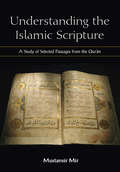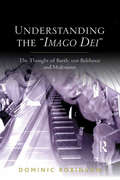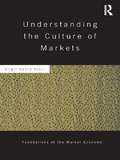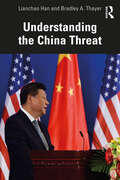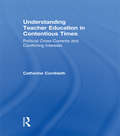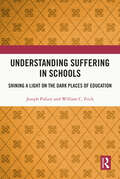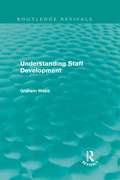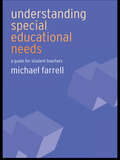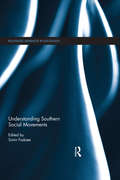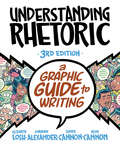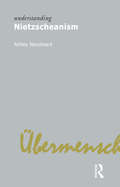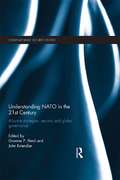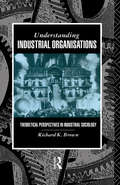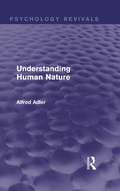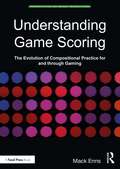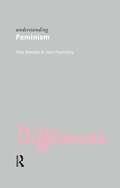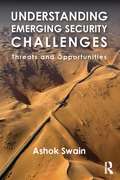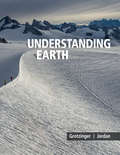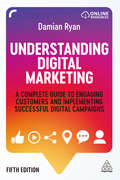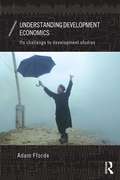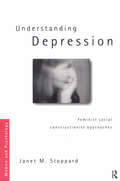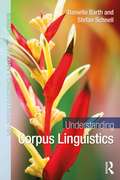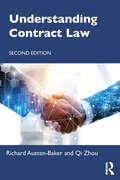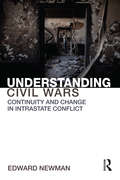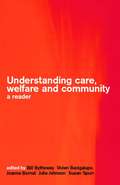Special Collections
Benetech’s Global Certified Accessible Titles
Description: Benetech’s GCA program is the first independent third-party EPUB certification to verify ebook accessibility. By creating content that is born accessible, publishers can meet the needs of all readers. Learn more: https://bornaccessible.benetech.org/
- Table View
- List View
Understanding the Islamic Scripture
by Mustansir MirThis book makes the Qur'an accessible to the English-speaking student who lacks the linguistic background to read it in the original Arabic by offering accessible translations of, and commentary on, a series of selected passages that are representative of the Islamic scripture. Mustanstir Mir, Director of the Center for Islamic Studies at Youngstown State University, offers clear translations and analysis of 35 selected passages of the Qur'an that will help students understand what kind of book the Qur'an is, what the scripture says, and how it says it.
Understanding the 'Imago Dei'
by Dominic RobinsonAs theologians across confessional divides try to say something significant about human dignity in our contemporary society, there is fresh interest in the ancient Christian doctrine that the human being is created in the 'imago Dei'. Theology is grounding responsibility for others and for the world around us in this common vision that the human being's infinite horizon lies in a divine calling and destiny. Robinson examines the 'imago Dei' debate through three giants of twentieth century theology - Karl Barth, Hans Urs von Balthasar, and Jürgen Moltmann. This is placed against a survey of the principle developments and distinctions relating to the doctrine in the history of Christian thought, which in itself will be valuable for all students of Theology. A fresh analysis of ecumenical contributions places the development of the doctrine in the context of the ongoing process of ecumenical dialogue on the dignity of the human person, with special reference to this theme in the first encyclical of Pope Benedict XVI, Deus Caritas Est. Whilst 'imago Dei' is the focus of this book, Robinson invites the reader to see its relevance to theology as a whole on a specifically ecumenical canvas, and relates directly to more general areas of theological anthropology, grace, salvation, and the relationship between God and the world.
Understanding the Culture of Markets
by Virgil StorrHow does culture impact economic life? Is culture like a ball and chain that actors must lug around as they pursue their material interests? Or, is culture like a tool-kit from which entrepreneurs can draw resources to aid them in their efforts? Or, is being immersed in a culture like wearing a pair of blinders? Or, is culture like wearing a pair of glasses with tinted lenses? Understanding the Culture of Markets explores how culture shapes economic activity and describes how social scientists (especially economists) should incorporate considerations of culture into their analysis. Although most social scientists recognize that culture shapes economic behavior and outcomes, the majority of economists are not very interested in culture. Understanding the Culture of Markets begins with a discussion of the reasons why economists are reluctant to incorporate culture into economic analysis. It then goes on to describe how culture shapes economic life, and critiques those few efforts by economists to discuss the relationship between culture and markets. Finally, building on the work of Max Weber, it outlines and defends an approach to understanding the culture of markets. In order to understand real world markets, economists must pay attention to how culture shapes economic activity. If culture does indeed color economic life, economists cannot really avoid culture. Instead, the choice that they face is not whether or not to incorporate culture into their analysis but whether to employ culture implicitly or explicitly. Ignoring culture may be possible but avoiding culture is impossible. Understanding the Culture of Markets will appeal to economists interested in how culture impacts economic life, in addition to economic anthropologists and economic sociologists. It should be useful in graduate and undergraduate courses in all of those fields.
Understanding the China Threat
by Bradley A. Thayer and Lianchao HanThis book examines the contours of the U.S.–China confrontation and its future trajectories. It delineates the two major causes of the friction in Sino-American relations—change in the balance of power in China’s favor and the conflicting ideologies of the two states—and emphasizes why it is imperative for the U.S. to hold on to its ideological principles. It demonstrates the ultimate and irreconcilable gap in the visions the two competitors have for international politics and consequently why conflict—certainly cold, and very possibly hot—is inevitable. The authors also suggest measures which the U.S. can adopt to sustain its leadership and deter China’s ideology and vision for the future of global politics. A significant contribution to the study of Sino-American relations, the volume will be of interest to scholars and researchers of international relations, foreign policy, and U.S. and Chinese politics. It will be of great interest to think tanks, public policy professionals, and the interested general reader.
Understanding Teacher Education in Contentious Times
by Catherine CornblethUnderstanding Teacher Education in Contentious Times examines how public, professional, and private or corporate agencies operate to shape teacher education and possibilities for its improvement. Teacher education programs, particularly those leading to state certification or licensure, are influenced not only by state regulations but also by required review and accreditation by an outside agency such as the National Council for the Accreditation of Teacher Education, and are subject to various contextual pressures such as the cultures of the institutions that host them and their surrounding communities, their potential student and employer markets, strong individuals, professional organizations, history or tradition, and, increasingly, external, usually privately-funded, special interest corporations such as the National Council on Teacher Quality. Unique among books on teacher education, this volume interweaves—in historical context including emerging trends—the complex contexts in which practice and reform efforts take place and are supported or impeded.
Understanding Suffering in Schools
by William C. Frick and Joseph PolizziDrawing inspiration from Dr. Willi Schohaus’s classic text The Dark Places of Education, this book contributes to the discussion by defining suffering in schools and providing a survey of the American school system’s inadequacies in the early twenty-first century. Through testimonies from former students on the ways they experienced suffering in school, this volume demonstrates how suffering can profoundly affect one’s academic growth and development—or worse. By analyzing the findings within a multidisciplinary ethical and educational framework, this volume presents a moral vision for understanding the role that suffering plays in school. Drawing on research in medicine, psychology, social sciences, religion, and education, this text weaves together many strands of thinking about suffering. This book is essential reading for academics, researchers, and postgraduate students in the fields of educational leadership, foundations of education, and those interested in both the history of education and critical contemporary accounts of schooling.
Understanding Staff Development
by Graham WebbFirst published in 1996, this book charts the philosophical landscape of staff development at a time when the subject of ‘quality’ in university teaching and learning was under examination. Graham Webb considers three main issues in his research. He focuses on what the basis for educational and staff development actually is and looks at the weaknesses of the then current practices, as well as deliberating over the future of informed staff development. This book will be of interest to staff developers of all kinds and more generally, to anyone concerned with education and human development.
Understanding Special Educational Needs
by Michael FarrellTeachers need to be fully equipped to respond to diversity in today's classrooms now more than ever before. The Professional Standards for Qualified Teacher Status and Induction Standards are now the driving force behind initial teacher education, and students will need to demonstrate their competence against these, and in particular, their understanding of Special Educational Needs in today's inclusive classrooms. Each chapter of this indispensable text explores an important topic within SEN and directly relates it to the competencies, making it an essential course companion. Chapters on topics relating to the code of practice, school policy, literacy and numeracy, ICT, emotional and behavioural difficulties and dealing with parents all follow a similar template, which includes: a commentary on the relevant professional standards contextualising of the standards what teachers can do to promote effective practice. Detailed referencing will lead students to pursue more detailed individual texts, which address many of the issues in greater depth. This is an ideal, highly accessible text for student and new qualified teachers who need a reliable introduction to today's vital issues within Special Educational Needs.
Understanding Southern Social Movements
by Simin FadaeeSouthern social movements have played an important role in shaping world history and politics. Nevertheless, scholarly literature on movements of the global South remains limited and restricted to testing the social movement theory which was developed in the North. This Northern-centric approach largely fails to provide a meaningful understanding of Southern movements because it is not directly applicable to the differing historical backgrounds, culture and socio-economic structures found in the South. Much of the uniqueness and complexity of Southern social movements has therefore been overlooked. This collection analyses recent events and developments in Southern social movements, introducing well-researched case studies from fifteen countries of the global South. Arranged in two parts, the volume examines firstly movements which focus on rights and quality of life issues, and secondly the post-2011 wave of uprisings which started with Tunisian and Egyptian movements. Contributing to ongoing discussions about the Northern-centric nature of social movement theory and the social sciences more generally, the authors enter into dialogue with the debate on local and national levels, as well as globalizing processes. Through an interdisciplinary approach this book broadens the theoretical and empirical perspectives for the study of social movements and will appeal to sociologists, political scientists, scholars and students of social movements, and social activists.
Understanding Rhetoric
by Jonathan Alexander and Elizabeth Losh and Kevin Cannon and Zander CannonAfter shaking up writing classrooms at more than 550 colleges, universities, and high schools, Understanding Rhetoric, the comic-style guide to writing, has returned for a third edition! Understanding Rhetoric encourages deep engagement with core concepts of writing and rhetoric. With brand-new coverage of fake news, sourcing the source, podcasting as publishing, and support for common writing assignments, the new edition of the one and only composition comic covers what students need to know—and does so with fun and flair.
Understanding Nietzscheanism
by Ashley WoodwardNietzsche's critiques of traditional modes of thinking, valuing and living, as well as his radical proposals for new alternatives, have been vastly influential in a wide variety of areas, such that an understanding of his philosophy and its influence is important for grasping many aspects of contemporary thought and culture. However Nietzsche's thought is complex and elusive, and has been interpreted in many ways. Moreover, he has influenced starkly contrasting movements and schools of thought, from atheism to theology, from existentialism to poststructuralism, and from Nazism to feminism. This book charts Nietzsche's influence, both historically and thematically, across a variety of these contrasting disciplines and schools of interpretation. It provides both an accessible introduction to Nietzsche's thought and its impact and an overview of contemporary approaches to Nietzsche.
Understanding NATO in the 21st Century
by John Kriendler and Graeme HerdUnderstanding NATO in the 21st Century enhances existing strategic debates and clarifies thinking as to the direction and scope of NATO’s potential evolution in the 21st century. The book seeks to identify the possible contours and trade-offs embedded within a potential third "Transatlantic Bargain" in the context of a U.S. strategic pivot in a "Pacific Century". To that end, it explores the internal adaptation of the Alliance, evaluates the assimilation of NATO's erstwhile adversaries, and provides a focus on NATO’s operational future and insights into the new threats NATO faces and its responses. Each contribution follows a similar broad tripartite structure: an examination of the historical context in which the given issue or topic has evolved; an identification and characterization of key contemporary policy debates and drivers that shape current thinking; and, on that basis, a presentation of possible future strategic pathways or scenarios relating to the topic area. This book will appeal to students of NATO, international security and international relations in general.
Understanding Industrial Organizations
by Richard Brown and Prof Richard BrownUnderstanding Industrial Organizations critically reviews the approaches developed by industrial sociologists to analyze industrial organizations. It outlines four general perspectives on organizations - systems thinking, contingency approach, the action approach and labour process for a more adequate sociology of organizations. The book provides a clear, relevant and important contribution to the sociology of organizations.
Understanding Human Nature
by Alfred AdlerOriginally published in 1928 this book was an attempt to acquaint the general public with the fundamentals of Individual Psychology. At the same time it is a demonstration of the practical application of these principles to the conduct of everyday relationships, and the organization of our personal life. Based upon a years’ lectures to audiences at the People’s Institute in Vienna, the purpose of the book was to point out how the mistaken behaviour of the individual affects harmony of our social and communal life; to teach the individual to recognize their own mistakes; and finally, to show them how they may effect a harmonious adjustment to the communal life. Adler felt that mistakes in business or in science were costly and deplorable, but mistakes in the conduct of life are usually dangerous to life itself. This book is dedicated by the author in his preface ‘to the task of illuminating man’s progress toward a better understanding of human nature.’
Understanding Game Scoring
by Mack EnnsUnderstanding Game Scoring explores the unique collaboration between gameplay and composition that defines musical scoring for video games. Using an array of case studies reaching back into the canon of classic video games, this book illuminates the musical flexibility, user interactivity and sound programming that make game scoring so different from traditional modes of composition. Mack Enns explores the collaboration between game scorers and players to produce the final score for a game, through case studies of the Nintendo Entertainment System sound hardware configuration, and game scores, including the canonic scores for Super Mario Bros. (1985) and The Legend of Zelda (1986). This book is recommended reading for students and researchers interested in the composition and production of video game scores, as well as those interested in ludo-musicology.
Understanding Feminism
by Peta Bowden and Jane Mummery"Understanding Feminism" provides an accessible guide to one of the most important and contested movements in progressive modern thought. Presenting feminism as a dynamic, multi-faceted and adaptive movement that has evolved in response to the changing practical and theoretical problems faced by women, the authors take a problem-oriented approach that maps the complex strands of feminist thinking in relation to women's struggles for equal recognition and rights, and freedom from oppressive constraints of sex, self-expression and autonomy. Each chapter focuses on a different cluster of concerns, demonstrating key moves in second-wave feminist thought, as well as some of the diversity in response-strategies that encompass both socio-economic and cultural-symbolic concerns. This approach not only shows how central feminist insights, theories and strategies emerge and re-emerge across different contexts, but makes clear that far from being 'over', feminism remains a vital response to the diverse issues that women (and men) find pressing and socially important.
Understanding Emerging Security Challenges
by Ashok SwainThis book offers an overview of emerging security challenges in the global environment in the post-Cold War era. After the fall of the Berlin Wall and the subsequent shifting of international political environment, a new broader concept of security began to gain acceptance. This concept encompassed socio-economic-environmental challenges, such as resource scarcity and climate change, water-sharing issues, deforestation and forest protection measures, food and health security, and large population migration. The book examines the causes and consequences of these emerging security threats, and retains a critical focus on evolving approaches to address these issues. The author attempts to develop a framework for sustainable security in a rapidly changing global political landscape, which seeks to bring states and societies together in a way that addresses weaknesses of the evolving international system. Moreover, through a detailed analysis of the emerging security issues and their pathways, the book further argues that the evolving processes not only pose critical challenges but also provide remarkable opportunity for cooperation and collaboration among and within various stakeholders. This book will be of much interest to students of global security, war and conflict studies, peace studies and IR in general.
Understanding Earth
by John Grotzinger and Thomas JordanGeology is everywhere in our daily lives. We are surrounded by materials and resources extracted from the Earth, our climate is changing at alarming rates, and hazards due to Earth’s processes are leading to major catastrophes. We will be reliant upon a population of informed citizens to make and vote for policies that protect our Earth, and change that will keep our planet habitable. Therefore, understanding our Earth has never been more important. Understanding Earth leads the way by fully integrating the study of climate science into the core intro geology curriculum. Through strategic placement of the climate science chapters at the beginning of the geomorphology content, we offer a text that places our changing climate as a key force shaping the rest of our discussion on Earth’s surficial processes.
Understanding Digital Marketing
by Damian RyanThe world of digital media is constantly changing, as technologies continue to transform the way we interact and communicate on a global scale. In this climate, Understanding Digital Marketing provides a practical, no-nonsense guide to digital marketing, from strategy and digital transformation to best-practice basics and trends. Clear, informative and packed with case studies and examples, it gives an essential grounding in SEO, email marketing, social media, content marketing, performance marketing and much more.This fifth edition of the bestselling Understanding Digital Marketing is fully updated to reflect the latest global developments in the industry. Complete with first-hand accounts of what success in digital marketing looks like, this book is an essential resource for practitioners and students alike. It is now required reading for more than 100 universities and colleges, and has received endorsements from Harvard University, Hult Business School and the Chartered Institute of Marketing.
Understanding Development Economics
by Adam FfordeImportant parts of development practice, especially in key institutions such as the World Bank, are dominated by economists. In contrast, Development Studies is largely based upon multidisciplinary work in which anthropologists, human geographers, sociologists, and others play important roles. Hence, a tension has arisen between the claims made by Development Economics to be a scientific, measurable discipline prone to wide usage of mathematical modelling, and the more discursive, practice based approach favoured by Development Studies. The aim of this book is to show how the two disciplines have interacted, as well as how they differ. This is crucial in forming an understanding of development work, and to thinking about why policy recommendations can often lead to severe and continuing problems in developing countries. This book introduces Development Economics to those coming from two different but linked perspectives; economists and students of development who are not economists. In both explaining and critiquing Development Economics, the book is able to suggest the implications of these findings for Development Studies, and more broadly, for development policy and its outcomes.
Understanding Depression
by Janet StoppardWomen are particularly vulnerable to depression. Understanding Depression provides an in-depth critical examination of mainstream approaches to understanding and treating depression from a feminist perspective. Janet Stoppard argues that current approaches give only partial accounts of womens' experiences of depression and concludes that a better understanding will only be achieved when womens' experiences and lived realities are considered in relation to the material and social conditions in which their everyday lives are embedded. The impact of this change in approach for modes of treatment are discussed and solutions are suggested.Understanding Depression offers new insights into the problem and its treatment. It will prove useful to those with an interest in depression and gender as well as mental health practitioners.
Understanding Corpus Linguistics
by Danielle Barth and Stefan SchnellThis textbook introduces the fundamental concepts and methods of corpus linguistics for students approaching this topic for the first time, putting specific emphasis on the enormous linguistic diversity represented by approximately 7,000 human languages and broadening the scope of current concerns in general corpus linguistics. Including a basic toolkit to help the reader investigate language in different usage contexts, this book: Shows the relevance of corpora to a range of linguistic areas from phonology to sociolinguistics and discourse Covers recent developments in the application of corpus linguistics to the study of understudied languages and linguistic typology Features exercises, short problems, and questions Includes examples from real studies in over 15 languages plus multilingual corpora Providing the necessary corpus linguistics skills to critically evaluate and replicate studies, this book is essential reading for anyone studying corpus linguistics.
Understanding Contract Law
by Qi Zhou and Richard Austen-BakerUnderstanding Contract Law provides an accessible, in-depth analysis of the purpose of contracting and the role of the law of contract, as well as theories that inform it. Assessing the historical development of this cornerstone of law, the book provides detailed analysis of some of the leading theoretical explanations, and how they are applied in jurisdictions throughout the world. With a new chapter examining the impact of globalization on contract law, this new edition also includes recent behavioural research around responses to contract breach. The book’s accessibility is enhanced by text boxes defining key concepts and terms, and biographical notes of leading figures and scholars. This ensures that readers are able to gain a clear understanding of the narratives and theories explained in the book, and to appreciate how contract law has evolved. Uniquely, the book is not limited to one jurisdiction, making this an essential text for students wishing to expand their knowledge of this fundamental area of law around the world.
Understanding Civil Wars
by Edward NewmanThis volume explores the nature of civil war in the modern world and in historical perspective. Civil wars represent the principal form of armed conflict since the end of the Second World War, and certainly in the contemporary era. The nature and impact of civil wars suggests that these conflicts reflect and are also a driving force for major societal change. In this sense, Understanding Civil Wars: Continuity and change in intrastate conflict argues that the nature of civil war is not fundamentally changing in nature. The book includes a thorough consideration of patterns and types of intrastate conflict and debates relating to the causes, impact, and ‘changing nature’ of war. A key focus is on the political and social driving forces of such conflict and its societal meanings, significance and consequences. The author also explores methodological and epistemological challenges related to studying and understanding intrastate war. A range of questions and debates are addressed. What is the current knowledge regarding the causes and nature of armed intrastate conflict? Is it possible to produce general, cross-national theories on civil war which have broad explanatory relevance? Is the concept of ‘civil wars’ empirically meaningful in an era of globalization and transnational war? Has intrastate conflict fundamentally changed in nature? Are there historical patterns in different types of intrastate conflict? What are the most interesting methodological trends and debates in the study of armed intrastate conflict? How are narratives about the causes and nature of civil wars constructed around ideas such as ethnic conflict, separatist conflict and resource conflict? This book will be of much interest to students of civil wars, intrastate conflict, security studies and international relations in general.
Understanding Care, Welfare and Community
by Julia Johnson and Vivien Bacigalupo and Joanna Bornat and Bill Bytheway and Susan SpurrCare, welfare and community are three key concepts in contemporary social policy. This reader covers a wide range of topics associated with them and relevant to the delivery of care and support to adults. It includes a wide-ranging collection of articles by leading writers and researchers, some previously published, some newly commissioned. It also has first-hand accounts by users and providers of care and welfare in the community. Groups covered include people with mental health problems, homeless people, older people, people with learning difficulties and people with impairments. The focus throughout is on how policies and practice can be developed appropriately and sensitively through an understanding of current issues.
The 40 chapters are grouped into four sections, each with an introduction. Five of the chapters are made up of extracts from a wide range of documents and testimonies.
Most of the material relates to a diverse turn-of-the-century Britain, but this is set in a wider context enabling the student to explore the alternative realities of other countries and other times.
Understanding Care, Welfare and Community provides an integrated, multidisciplinary overview of the many different aspects of community care. It is appropriate for students and professionals following a wide range of courses in social work, nursing, care, health, social policy, medicine, voluntary work and welfare services. It will also be a valuable resource for carers and practitioners, teachers and policy makers.
